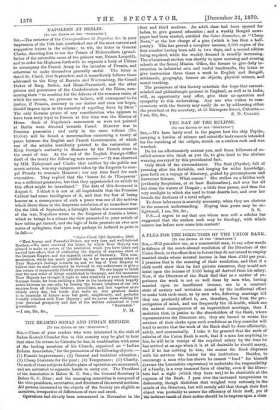NAPOLEON AT BERLIN.
[TO THE EDITOR OF THE "SPECTATOR."]
Sir,—The reviewer of the Correspondance de Napoleon ler. in your
impression of the 10th inst. overlooked one of the most curious and suggestive letters in the volume ; to wit, the letter to General Clarke, directing him to see the Prince of Hohenzollern (grand- father of the ostensible cause of the present war, Prince Leopold), and to order his Highness forthwith to organize a body of Uhlans to accompany the French Army in the invasion of Prussia, and otherwise to make themselves generally useful. The letter is dated St. Cloud, 21st September, and it immediately follows those addressed to the King of Bavaria and Wiirtemburg, the Grand Dukes of Berg, Baden, and Hesse-Darmstadt, and the other princes and potentates of the Confederation of the Rhine, sum- moning them "to combine for the defence of the common cause, of which the success, we presume to believe, will correspond to its justice, if Prussia, contrary to our desires and even our hopes, should impose upon us the necessity of repelling force by force."
The only German prince of any consideration who appears to have been truly loyal to Prussia at this time was the Elector of Hesse. Such of Napoleon's movements as were not pointed at Berlin were directed towards Cassel. Hanover was in Prussian possession ; and early in the same volume (No.
10,604) will be found a memorandum concerning a treaty of peace between the English and French Governments, of which one of the articles manifestly pointed to the restoration of King George's authority in Hanover by the French arms in the event of war. At the end of the English Foreign-Office draft of the treaty the following note occurs :—" It was observed by MM. Talleyrand and Clarke that neither by the public nor secret articles, was any engagement taken by the Emperor to com- pel Prussia to evacuate Hanover ; nor any time fixed for such evacuation. They replied that the 'bonne foi de l'Empereur ' was a sufficient guarantee, but that they apprehended an article to this effect might be introduced." The date of this document is August 6. I think it is not at all improbable that the Prussian Cabinet had some intelligence of it, and that the fear of losing
honour as a consequence of such a peace was one of the motives which drove them to the desperate resolution of an immediate war. On the 12th of September, a fortnight before the commencement of the war, Napoleon wrote to the Emperor of Austria a letter, which so brings to a climax the view presented in your article of bow tables get turned, and the logic of facts presents an ever new series of syllogisms, that you may perhaps be induced to print it in full :— "Saint Cloud, 12th Septembre, 1806.
"Most Serene and Powerful Prince, ray very dear and well-beloved Brother,—We have received the letter, by which Your Majesty was pleased to make us aware of the resolution which you have taken and carried into effect, that of abdicating the dignity of supreme chief of the German Empire and the imperial crown of Germany. This com- munication, which has much gratified us, is for us a precious token of Your Majesty's feelings towards us, and we beg of Your Majesty to believe that we shall constantly be forward in our endeavours to give a due return of reciprocally friendly proceedings. We are happy to think that the new order of things established in Germany, and the measures Your Majesty has thought it right to take relatively to your hereditary German States, far from striking a blow to the harmony which happily exists between us, can only, by freeing the future relations of our two empires from all foreign interest, consolidate, and link together more closely every day, the bonds that unite us. Oar greatest desire is to entertain in future none but good, neighbourly, and perfectly friendly relations with Your Majesty ; and we never cease wishing for your personal prosperity and that of the nations submitted to your
government. "NAPOLEON."


































 Previous page
Previous page